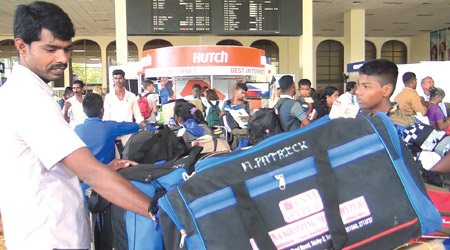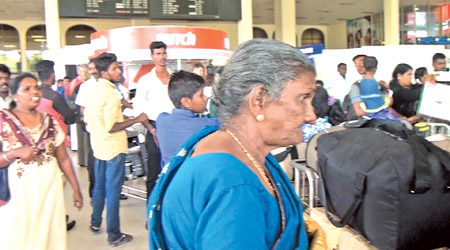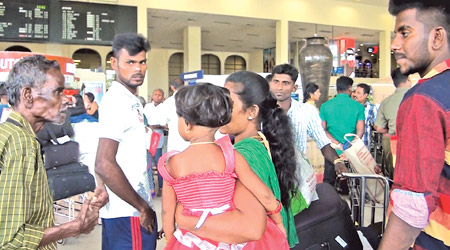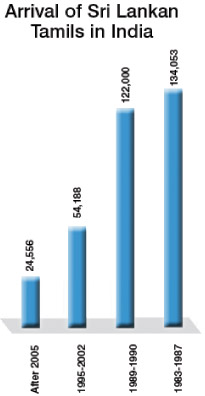Refugees from India eager to return, even if they have to:
Begin From
The Beginning
by Manjula Fernando
 |
|
- Pix: Kumarasiri Prasad
|
 |
| |
 |
|
Refugees at the BIA last
week |
The trickle of refugees returning from India to Sri Lanka since 2012
is gradually gaining momentum with the situation in post war Sri Lanka
beginning to look re-assuring for the Tamil refugees who fled the
country decades ago.
A batch of 75 Lankans from Tamil Nadu returning to Mannar, Jaffna,
Vavuniya, Kilinochchi, Trincomalee and Mullaitivu on Tuesday, signified
this build up of confidence. Returning from Trichy, Chennai and Madurai,
it was the biggest single group to come voluntarily in the recent past.
The government is yet to begin an advocacy strategy to bring back the
refugees home, according to the Prison Reforms, Rehabilitation and
Resettlement Ministry.
The recent repatriations of the refugees were facilitated by the
UNHCR and the Resettlement Ministry with the Sri Lankan mission in
Chennai helping the paper work.
There is clear enthusiasm from refugees to come home, but the
independent groups working at ground level facilitating their return,
lament that bureaucratic red tape is still a major hassle. OfERR Sri
Lanka President and refugee advocate S.Sooriyakumari, says, the
government is making efforts to facilitate the resettlement of refugees
from India and a largely seamless system is in place. But, as regards
action, there is still feet dragging. "Almost everyone who returned is
happy to have come back, and are elated that they are not refugees
living in a camp anymore. There is a sense of belonging."
Yet, Sooriyakumari says, the start up is hard and unpleasant. "These
people come back with a few belongings in a suitcase. They have to start
from scratch."
According to her, those who have lived many years in a refugee camp
are used to a somewhat easy life. They were being cared for, provided
with accommodation, financial assistance and food rations. Even their
water and electricity bills were paid for. But, back in Sri Lanka the
start up assistance will last for a limited period and thereafter, they
will be on their own.
One may think, housing and livelihoods would be the biggest hurdles
for them. However, Sooriyakumari said, the paperwork proves to be harder
and obtaining the National Identity Card (NIC) is the hardest for the
returnees.
The people born in India need to get their Sri Lankan citizenship
sorted out, to apply for the NIC. Without the NIC even the educated are
unable to find employment in the state or private sector. Most of the
youth returning were either toddlers or weren't even born when their
parents left Sri Lankan shores for fear of the violence unleashed during
the conflict between the LTTE terrorists and the Government Forces, in
the period 1983 to 2009.
The youth need to make an additional payment of Rs.25,000 to get Sri
Lankan citizenship. They are not exempted from that penalty, and are
required to submit about 12 documents in total, one of which includes
the details of their great grandfather and the confirmation of their
residency in Sri Lanka. In addition, they must submit their Indian birth
certificate and the consular birth certificate.
The confirmation of residency is issued by the Grama Niladari. The
document needs to be countersigned by the Divisional Secretary to be
valid. Sometimes, Divisional Secretaries are ill informed of these
procedures, and life then becomes difficult for the returnees.
Nearly 250 applications of citizenship, some who have come as early
as 2010, are still pending. Sooriyakumari says, the government has
promised mobile services to solve their immediate resettlement issues,
which is a welcome move.
The Resettlement Ministry is facilitating training in the palmyrah
trade, agriculture and fisheries sectors, for the refugees. However, for
those who have been out of their traditional livelihoods for decades, it
is not easy to start afresh.
One refugee had declared that, her husband, a fisherman before
fleeing to India, had not ventured into sea for 26 years. "These are the
issues we have to deal with," Sooriyakumari said.
After the government training, the returnees can apply for loans from
state banks. They need a bank account to prove their trustworthiness.
But, their ability to repay without a steady income is a major worry.
"Starting a new life here is not easy, yet, people opt to come back.
Therefore, integration has to be encouraged by simplifying and relaxing
rules and regulations for the war battered," she explained. There are
also hurdles that need to be cleared for refugees who are willing and
have the ability to resettle in their own lands. They need assistance to
get the long abandoned lands inhabitable.
The UNHCR had been visiting the refugee camps in Tamil Nadu once a
month and updating the Sri Lankans about waiting opportunities back in
the island - in education, employment, freedoms and also the fact that
they would no longer be second class citizens in Sri Lanka. There have
been issues over limited higher education opportunities and employment
in the state sector for the children of refugees in India. Last week,
some 600 people protested in Chennai demanding freedom and
opportunities.
 The News Minute quoted one Dharmalingam Raja, 57, a daily paid worker
among the protestors demanding citizenship. "Three generations of my
family are living in India, my children and their children were born
here, but are still not given citizenship in this country," Dharmalingam
told News Minute. "Our children do not get proper jobs. Even if they
achieve a college degree, private companies do not recruit them, neither
can they apply for government jobs. Many of them end up doing daily paid
work," he said. News of the development efforts of the once war torn
regions in the North and East provinces and the ongoing reconciliation
efforts of the government have reached the refugee community. They are
optimistic of the happenings in Sri Lanka. Prison Reforms,
Rehabilitation and Resettlement Ministry Secretary V.Sivagnanasothy
said, it is just the beginning of the return of the remaining refugees
in India. "Their confidence has been building and they are aware of the
ongoing reconciliation efforts of the government," he said. The News Minute quoted one Dharmalingam Raja, 57, a daily paid worker
among the protestors demanding citizenship. "Three generations of my
family are living in India, my children and their children were born
here, but are still not given citizenship in this country," Dharmalingam
told News Minute. "Our children do not get proper jobs. Even if they
achieve a college degree, private companies do not recruit them, neither
can they apply for government jobs. Many of them end up doing daily paid
work," he said. News of the development efforts of the once war torn
regions in the North and East provinces and the ongoing reconciliation
efforts of the government have reached the refugee community. They are
optimistic of the happenings in Sri Lanka. Prison Reforms,
Rehabilitation and Resettlement Ministry Secretary V.Sivagnanasothy
said, it is just the beginning of the return of the remaining refugees
in India. "Their confidence has been building and they are aware of the
ongoing reconciliation efforts of the government," he said.
Of the 102, 000 refugees currently living in India, 64,000 are in 109
welfare camps. Others live with friends and relatives scattered
throughout the state of Tamil Nadu."We see increasing numbers of people
returning to the country on their own. The frequency of such trips is
also increasing," the Ministry Secretary said.
He said, there is no pressure from the Sri Lankan government or the
Indian government for their return. There was no aggressive campaign to
bring back the refugees in Tamil Nadu. "We will do that after the
remaining IDPs are resettled," he said.
The government is extending support to the UNHCR to resettle the
refugees who come back willingly. Currently, the Government is
discussing whether an advocacy strategy would be required to get the
remaining refugees back. Asked about the news reports of the refugees
selling human organs to buy illegal passage to Australia, he said, he
cannot confirm about their accuracy. "There are news reports, but we
haven't been able to verify the information." He said: "We have not
received any formal complaints, and we have not heard from the Foreign
Ministry either." |

